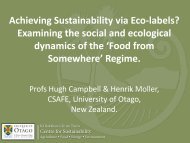Book of Abstract (incl. addendum) - IFSA symposium 2012
Book of Abstract (incl. addendum) - IFSA symposium 2012
Book of Abstract (incl. addendum) - IFSA symposium 2012
You also want an ePaper? Increase the reach of your titles
YUMPU automatically turns print PDFs into web optimized ePapers that Google loves.
Workshop 1.1 Knowledge flows in pluralistic research and advisory systems: how do advisors<br />
keep up-to-date and to what extent is their advice evidence-based?<br />
Advisory Devices Features Farmer’s Capacity for Innovation and Lock-in<br />
Hélène Brives, Pauline Riousset and Stéphane de Tourdonnet<br />
AgroParisTech, France<br />
Helene.Brives@agroparistech.fr<br />
Agroecology theoreticians argue that agroecology cannot be transferred like technology but requires<br />
alternative extension practices through participatory networks (Warner 2008). Promotion <strong>of</strong><br />
conservation agriculture in France stands on the same position criticizing scientist laboratory methods<br />
and extension services expertise. In a context <strong>of</strong> privatization <strong>of</strong> extension services, agrobusiness firms<br />
play a major role in the extension <strong>of</strong> conservation agriculture (Labarthe 2006, Goulet 2008).<br />
This communication addresses the following research questions: i) What are private bodies’<br />
extension strategies for agroecological practices and what are the techniques extended under the label<br />
“conservation agriculture”? ii) How does an advisory device feature farmers’ innovation capacity and<br />
the flexibility <strong>of</strong> their technical systems?<br />
Our research is based on a field work within a French cooperative which defines its business<br />
plan in terms <strong>of</strong> sustainable development and “ecological intensification.” Conservation agriculture is a<br />
textbook example <strong>of</strong> the approach. In this cooperative <strong>of</strong> eastern France, two advisors, both equally<br />
eager to promote conservation agriculture, are using contrasted methods: one provides instructions on<br />
conservation agriculture while the other organizes a network <strong>of</strong> participatory social learning.<br />
The results obtained are as follows:<br />
● Advisory devices are contrasted<br />
● Conservation agriculture leads to a range <strong>of</strong> prescriptions and agronomical practices<br />
● Innovation processes, dependences and lock-in:<br />
In the first case, farmer’s capacity for innovation is built on the advisor taking on the management <strong>of</strong><br />
risks. Only one agronomic system and one way to achieve it, is thus possible. In the club, farmer’s<br />
capacity for innovation is built on the availability <strong>of</strong> a wide range <strong>of</strong> means to solve problems and thus<br />
allows a diversity <strong>of</strong> agronomic systems and innovation paths. Expectations for GMOs are much<br />
greater in the first case than within the club.<br />
The advisors’ view on the privatized extension system in the federal state <strong>of</strong><br />
Brandenburg, Germany<br />
Ulrike Knuth and Andrea Knierim<br />
Leibniz-Centre <strong>of</strong> Agricultural Landscape Research (ZALF), Germany<br />
Knuth@zalf.de<br />
In the federal state <strong>of</strong> Brandenburg, Germany, provision <strong>of</strong> agricultural extension has been privatised in<br />
the early nineties. Since then, public financial support was reduced continuously until full deletion in<br />
2001. In 1996, a first empirical evaluation <strong>of</strong> Brandenburg's extension system (Bokelmann et al.<br />
1996) had been undertaken revealing the view <strong>of</strong> the advisors and farmers on the privatized system at<br />
that time. Since 2006, several empirical studies were carried out, that explore specific segments <strong>of</strong> the<br />
Brandenburg agricultural knowledge system, some focussing explicitly on the view <strong>of</strong> farm advisors.<br />
The paper presents selected results that characterise the advisors' perspective from those studies in<br />
2006 (Knuth 2008) and 2010 (Knierim et al. 2011).<br />
The privatisation process resulted in concentration and diminution <strong>of</strong> advisory services and<br />
cooperation between advisory companies was clearly reduced:<br />
Contentwise advisory services in Brandenburg tend to concentrate on economic topics, especially<br />
investment planning <strong>of</strong>ten combined with subsidy questions. Cross Compliance topics are seldomly<br />
discussed explicitly but combined with other interests <strong>of</strong> the farmer. Farm Management Systems<br />
(FMS) as a main instrument for CC advice in Germany are sparsely used in Brandenburg, as the<br />
development <strong>of</strong> FMS and the supply <strong>of</strong> CC advice were not co-funded by the state unlike in other<br />
16











